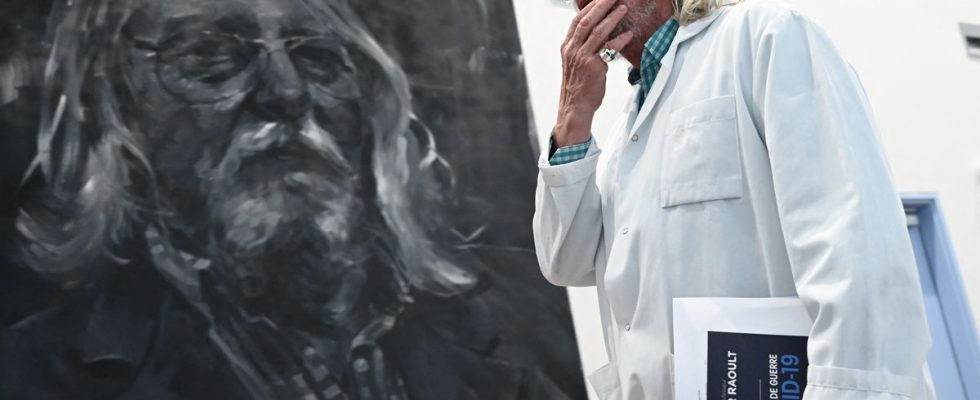He had been rather discreet since leaving the IHU in September 2022. Didier Raoult, 71, was visibly busy writing his autobiography, his seventeenth book, in which he partly settles his accounts with his detractors, destined for the “dustbins of History”. He also goes back in length to the Covid-19 pandemic and his approach made at the IHU, promoting in particular the effectiveness of hydroxychloroquine. “We were indeed right,” writes the Marseille microbiologist. But the former director of the IHU also opens up a little intimately, speaking of his childhood, his family saga, the “outstanding abilities whose nature [l]I had [t] endowed” and his abortive career as a sailor.
And since not everyone can “read a hundred books each year, excluding scientific works”, which Didier Raoult has maintained since he was ten years old, 20 minutes read for you Didier Raoult, uncompromising autobiographybook which appears this Thursday at Michel Lafon.
He dreamed of being a sailor
In just over three hundred pages, Didier Raoult has structured his autobiography in nineteen chapters and three major chronological themes: childhood, his pre-Covid professional activity and his academic rise before finally arriving at the period of the pandemic which earned him “a notoriety comparable to that of renowned artists and sportsmen”, he writes, judging it “sometimes even unpleasant”.
From his childhood – Didier Raoult was born in Senegal where his father was a military doctor – we will remember that the famous and controversial infectiologist repeated his fifth grade – “I found no interest in the lessons” – and gives us some anecdotes supporting his irreverent, restive character to authoritarianism, like the day when, at the age of 7 or 8, he urinates in the middle of the class after his teacher refused to relieve himself in the toilet. What feed the image of an extraordinary character, misunderstood and somewhat marginal although brilliant. Didier Raoult was expelled from two high schools for misconduct, committed a “false suicide attempt”, “intended to alert [s] are parents on [s] we feel bad”.
With this autobiography, Didier Raoult is fully part of his family saga, made up of “corsair ancestors”, “elders of resistance fighters”. “In my family, this family of heroes, I found my place (…) I was the fourth generation of an officer of the Legion of Honor. When Napoleon created it, he said that after two or three generations the title was definitively acquired by the family. Which corresponds to a title of nobility,” he explains.
After having briefly dreamed of being a sailor with experience in the merchant navy, the young Raoult obtained a literary baccalaureate as a free candidate, going there “with his hands in his pockets”, he laughs. A handful of weeks at the Faculty of Letters in Aix-en-Provence were enough to dissuade him from following this path, and finally embracing his father’s: medicine. The certainty of his superiority, with his IQ of 180 which he mentions in parentheses in his book, emanates from his pen – or that of Hervé Vaudoit, “collaborator of this book” – over the lines and chapters. A pride, even an arrogance, which still sticks to the skin of the most controversial doctor in France today.
This is particularly noticeable by the different incipits – these little phrases often taken from other books which introduce the chapters – which inform us about his models, intimate heroes, and perhaps reveal his presumptuous inclination. He quotes himself in the incipit of the chapter of the 13 entitled “There is no supreme savior” (a verse of the communist song The International), to which he adds a “neither Bill Gates, nor Pfizer, nor Gilead” of his composition (The International continues with “neither god, nor caesar, nor tribune”). But he also summons Hannah Arendt, the philosopher who defined totalitarianism, Karl Marx, Friedrich Nietzsche, Marc Bloch, Albert Camus or even Galileo, who was wrong to be right before everyone else. (To be honest, I expected at some point in this litany that he would quote Fidel Castro and his famous “Condemn me, I don’t care, history will absolve me”, but it never came. ).
“Those who bore me will have disappeared in the dustbins of history”
The part that we are all waiting for, the one where the Covid moment arrives – “this wind of madness which blew through the ranks of our decision-makers” – which is approached with method. Didier Raoult returns to more or less all the scientific controversies around the studies published by his team of researchers and his positions in favor of hydroxychloroquine. He retraces the thread of events, scientific publications and counter-publications, which he undertakes to demonstrate in what way they are biased. “We were indeed right”, he signs at the end of his chapters on the treatment he advocated. More generally, he also engages in a frontal attack from the lobbies of the pharmaceutical industry, “Big Pharma”, writes the doctor, who concludes: “corruption is endemic, not phantasmagorical”. And distributes the tackles to some of his colleagues, including Karine Lacombe or Jean-Paul Stahl, with whom he is also on trial for defamation. “While many colleagues were doing politics on television sets in Paris, we continued to do science in Marseille. »
He devotes the end of his book to the latest events at the IHU, of which he left the management in September 2022, without managing to obtain the right to keep an office. And in particular inspections by the Medicines Agency or Social Affairs. He finally concludes with a flight that will not make him less presumptuous: “I have named a thousand microbes (…) which everyone knows and will know that it was we who baptized them while all those who bore me will have disappeared in the dustbins of history”. After reading this book, one thing remains certain: Didier Raoult has a very high idea of himself. It is up to everyone to tell themselves if they are right or not to think so.

